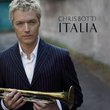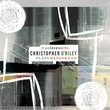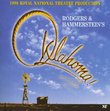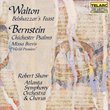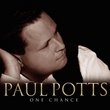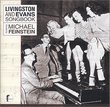| All Artists: Jubilant Sykes, Asher Edward Wulfman, Morgan State University Choir, Peabody Children's Chorus, Baltimore Symphony Orchestra, Marin Alsop Title: Bernstein: Mass Members Wishing: 0 Total Copies: 0 Label: Naxos American Original Release Date: 1/1/2009 Re-Release Date: 8/25/2009 Genre: Classical Styles: Opera & Classical Vocal, Historical Periods, Modern, 20th, & 21st Century, Symphonies Number of Discs: 2 SwapaCD Credits: 2 UPC: 636943962220 |
Search - Jubilant Sykes, Asher Edward Wulfman, Morgan State University Choir :: Bernstein: Mass
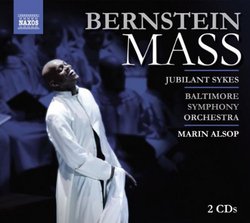 | Jubilant Sykes, Asher Edward Wulfman, Morgan State University Choir Bernstein: Mass Genre: Classical When Leonard Bernstein was asked by Jacqueline — Kennedy Onassis to compose the inaugural work — for the opening of The John F. Kennedy Center — for the Performing Arts in Washington, D.C., he — wrote: 'The Mass is also an ext... more » |
Larger Image |
CD DetailsSynopsis
Product Description When Leonard Bernstein was asked by Jacqueline Kennedy Onassis to compose the inaugural work for the opening of The John F. Kennedy Center for the Performing Arts in Washington, D.C., he wrote: 'The Mass is also an extremely dramatic event in itself it even suggests a theater work.' Premiered on September 8, 1971, with additional words by Stephen Schwartz of Godspell fame, Mass is a remarkable, visionary work with a kaleidoscope of musical styles that touches on themes of political protest, existential crisis and religious faith lost and found. Featuring Marin Alsop conducting the Baltimore Symphony Orchestra and soloist Jubilant Sykes. Similarly Requested CDs
|
CD ReviewsCritical MASS Rises UP! Tym S. | San Francisco, CA USA | 09/04/2009 (5 out of 5 stars) "Leonard Bernstein turned Catholic ritual into activist theatre with this crucial work. But the grand themes hardly make this a mental slog. This music moves and soars, takes surprise tangents and playful turns. It flows with beauty and grace the whole way. Its abundant riches encompass classical chorals and solos, Broadway musicals, world musics, modern dissonance, and sauntering rock and soul styles. Reading the lyrics, which are sung in English as often as Latin, only enriches that smooth ride. Bernstein has made this amazingly accessible without sacrificing any sophistication or depth. "Mass" reflects the social maelstrom of the counterculture uprisings of the late 60's and early 70's. In musical breadth and examination of belief it is a parallel of the rock musicals "Hair", "Jesus Christ Superstar", and "Godspell". Its themes of anger and confusion in the quest for self-divination also mirror The Who's rock opera "Tommy". Other contemporary spokes in this cycle include the baroque complexity that producer Charles Stephney brought to Rotary Connection's albums; the shining harmonies with tart lyrics of The Free Design; and producer David Axelrod's similar sonic explorations on The Electric Prune's "Mass In F Minor" and "Release Of An Oath" (1968). Rock fans may also find common musical ground with recent work like Dead Can Dance or Anne Dudley & Jaz Coleman; the classical works of Elvis Costello and Paul McCartney; the adventurous pop work of Ute Lemper and Anne Sofie von Otter; and the rock interpretations of Trio Rococo, The Brodsky Quartet, and The String Quartet. Bernstein didn't want to reitierate obedience to faith; he wanted to challenge it to prove itself worthy. "Mass" takes the ritual of Latin benediction chants and dissects them with the wit of Brecht and Weill. Its hero the Celebrant leads the congregation in prayer, until the crisis of faith of the increasingly critical masses reach critical mass and cause him to question his own belief. "Give us peace now and peace to hold on to/ And, God, give us some reason to want to." By extension the work questions the divine, the leadership of nations, and the choices of the individual. "Mass" is a confession of deep conflict, a rebellion against silent suffering, a dialogue of ideas. Some may consider the work's questioning of what is rote versus what is right as sacrilegious, but Bernstein succeeds in showing that soul-searching is what gives faith its relevance. The Celebrant's faith shatters when he flings the chalice to the floor: "It's odd how all my body trembles/ Like all this mass/ Of glass on the floor." But he is ultimately able to renew his belief as the simplicity of music shows him the reflection of divinity, and its eternal resonance within. Infamously, in paranoia about Bernstein's progressive views, the FBI warned President Nixon to avoid the premiere performance. They were uncomfortable with its themes of questioning authority, street rebellions, and anti-war stances. "God said to spread His commands/ To folks in faraway lands/ They may not want us there/ But, man, it's out of our hands." Nixon skipped out. Its political relevency has only increased in recent years, both in anti-war and ecological concerns: "Whispers of living, echoes of warning/ World without end spins endlessly on/ Only the men who lived here are gone/ No one to oil the seas/ No one to anything at all." Naturally it has seen four revivals during the second term of Bush. This is the one to get. Jubilant Sikes is a brilliant choice for the conflicted hero, with his versatile voice and equally supple delivery. All of the different choral groups and soloists also shine brightly. The music is always alive, flowing, surprising, and beautiful. And with 2 CDs for the price of 1, you can't lose! Viva, la revolucion." A worthy modern recording at last Santa Fe Listener | Santa Fe, NM USA | 09/04/2009 (5 out of 5 stars) "Pace a previous reviewer, Mass isn't a neglected masterpiece. For a troubled score that was greeted as grossly self-indulgent at its premiere, the work has been surprisingly durable. The reason is that Mass really works as theater. Its dizzying variety of styles, always tending toward pops and Broadway, not to mention unembarrassed kitsch, keeps an audience entertained. When stripped of stage action, however, the gaudy mixture of musical styles poses problems. The composer went for all-out razmataz in the premier recording on Sony, and for a long time that approach has held way. Now we have a viable alternative that is vigorous but not unbridled. Alsop took Mass from Baltimore to New York as part of last year's extravagant Bernstein festival. She scored a hit, and now we can hear why. As everyone else has noted, Jubilant Sykes brings a bluesy intensity and gospel righteousness to the Celebrant. Frankly, he's not just a revelation but a relief from crossover opera singers trying to sound hip. Sykes is a genuine heir to "Hair" as he tackles Bernstein's pastiche of Sixties politics and religious skepticism. His voice rings out thrillingly in a section like Epistle: The word of the Lord. A second strength is Alsop's decision to use professional Swingle Swinger-style vocalists in the close harmony jazzy sections, so reminiscent of Bernstein's early chamber opera, Trouble in Tahiti. In quite a few other places Alsop's tendency is to be much cooler and more precise than the composer. She doesn't have his exuberant swing, but who ever did? Stephen Schwartz's "see the hippies go to church" libretto still makes for a good deal of cringing, all the more so because the aging Bernstein so eagerly jumped on board. Street people he wasn't and never will be. For that reason, there are stretches that lag and lull in Mass, and Alsop doesn't succeed in hiding them. However, Sykes's sincerity carries the day in the final, melodramatic, luridly kitschy final breakdown. He deserves our gratitude, and does the whole enterprise. I wish Alsop hadn't remained so coolly restrained at times, but that's a small quibble. Mass has found a worthy modern recording at last. P.S. - Listening again to Mass, I found myself growing more and more squeamish. This mishmash of religious kitsch and Broadway has lowered my estimation of Bernstein more than any other single thing in his career. I hope my review doesn't fuel any notion that this mess is a masterpiece." The best of the lot J. A. Kawarsky | New Hope, PA United States | 09/04/2009 (5 out of 5 stars) "Many words have been written on this fascinating and quite often uneven work. This recording is the best. Jubilant Sykes hits a Home Run. The recording engineers deserve kudos. Everything makes sense for the first time. It's a "WOW"."
|

